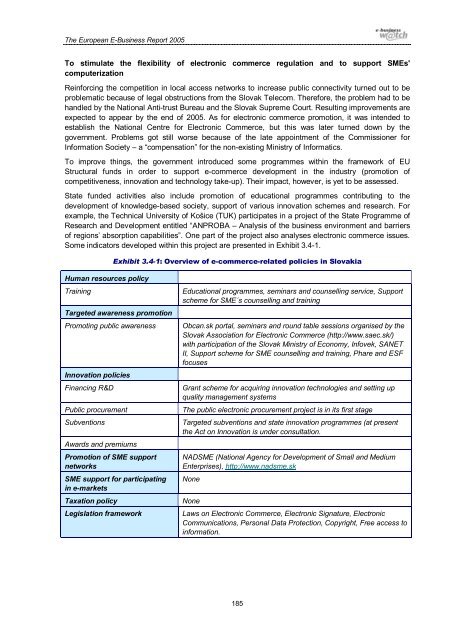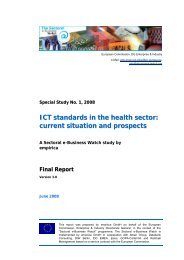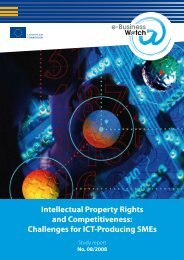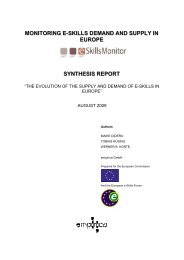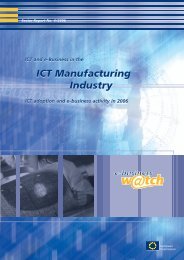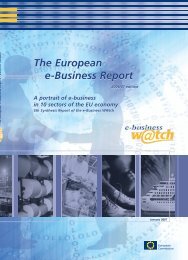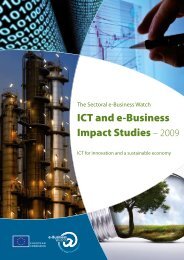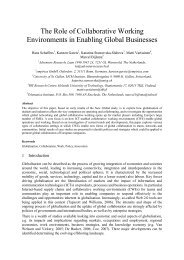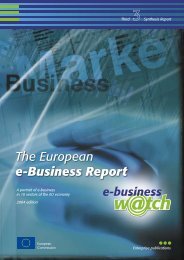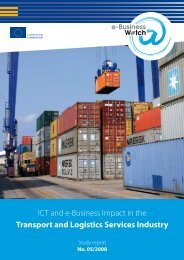The European e-Business Report The European e ... - empirica
The European e-Business Report The European e ... - empirica
The European e-Business Report The European e ... - empirica
You also want an ePaper? Increase the reach of your titles
YUMPU automatically turns print PDFs into web optimized ePapers that Google loves.
<strong>The</strong> <strong>European</strong> E-<strong>Business</strong> <strong>Report</strong> 2005<br />
To stimulate the flexibility of electronic commerce regulation and to support SMEs'<br />
computerization<br />
Reinforcing the competition in local access networks to increase public connectivity turned out to be<br />
problematic because of legal obstructions from the Slovak Telecom. <strong>The</strong>refore, the problem had to be<br />
handled by the National Anti-trust Bureau and the Slovak Supreme Court. Resulting improvements are<br />
expected to appear by the end of 2005. As for electronic commerce promotion, it was intended to<br />
establish the National Centre for Electronic Commerce, but this was later turned down by the<br />
government. Problems got still worse because of the late appointment of the Commissioner for<br />
Information Society – a “compensation” for the non-existing Ministry of Informatics.<br />
To improve things, the government introduced some programmes within the framework of EU<br />
Structural funds in order to support e-commerce development in the industry (promotion of<br />
competitiveness, innovation and technology take-up). <strong>The</strong>ir impact, however, is yet to be assessed.<br />
State funded activities also include promotion of educational programmes contributing to the<br />
development of knowledge-based society, support of various innovation schemes and research. For<br />
example, the Technical University of Košice (TUK) participates in a project of the State Programme of<br />
Research and Development entitled “ANPROBA – Analysis of the business environment and barriers<br />
of regions’ absorption capabilities”. One part of the project also analyses electronic commerce issues.<br />
Some indicators developed within this project are presented in Exhibit 3.4-1.<br />
Exhibit 3.4-1: Overview of e-commerce-related policies in Slovakia<br />
Human resources policy<br />
Training<br />
Targeted awareness promotion<br />
Promoting public awareness<br />
Innovation policies<br />
Financing R&D<br />
Public procurement<br />
Subventions<br />
Awards and premiums<br />
Promotion of SME support<br />
networks<br />
SME support for participating<br />
in e-markets<br />
Taxation policy<br />
Legislation framework<br />
Educational programmes, seminars and counselling service, Support<br />
scheme for SME´s counselling and training<br />
Obcan.sk portal, seminars and round table sessions organised by the<br />
Slovak Association for Electronic Commerce (http://www.saec.sk/)<br />
with participation of the Slovak Ministry of Economy, Infovek, SANET<br />
II, Support scheme for SME counselling and training, Phare and ESF<br />
focuses<br />
Grant scheme for acquiring innovation technologies and setting up<br />
quality management systems<br />
<strong>The</strong> public electronic procurement project is in its first stage<br />
Targeted subventions and state innovation programmes (at present<br />
the Act on Innovation is under consultation.<br />
NADSME (National Agency for Development of Small and Medium<br />
Enterprises), http://www.nadsme.sk<br />
None<br />
None<br />
Laws on Electronic Commerce, Electronic Signature, Electronic<br />
Communications, Personal Data Protection, Copyright, Free access to<br />
information.<br />
185


